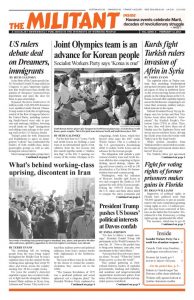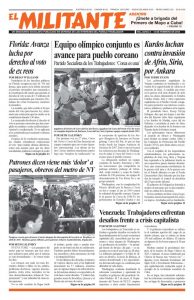Below is an excerpt from We Are Heirs of the World’s Revolutions by Thomas Sankara, one of Pathfinder’s Books of the Month for February. Sankara led the revolution in Burkina Faso (called Upper Volta until 1984) from 1983 until his assassination in 1987. Workers and peasants in this West African country established a popular revolutionary government that began to fight the hunger, illiteracy and economic backwardness imposed by imperialist domination, and the oppression of women inherited from millennia of class society. The excerpt is from the “Political Orientation Speech,” presented by Sankara over radio and television on Oct. 2, 1983, two months after the triumph of the revolution. Copyright © 2007 by Pathfinder Press. Reprinted by permission.
BY THOMAS SANKARA
The revolutions that occur around the world are not at all alike. Each revolution presents original features that distinguish it from the others. Our revolution, the August revolution, is no exception. It takes into account the special features of our country, its level of development, and its subjugation by the world imperialist capitalist system.
Our revolution is a revolution that is unfolding in a backward country, where the weight of tradition and ideology emanating from a feudal-type social organization weighs very heavily on the popular masses. It is a revolution in a country that, because of imperialism’s domination and exploitation of our people, has evolved from a colony into a neocolony.
It is a revolution occurring in a country still characterized by the lack of an organized working class conscious of its historic mission, and which therefore possesses no tradition of revolutionary struggle. It is a revolution occurring in a small country on the continent, at a time when, on the international level, the revolutionary movement is coming apart day by day, without any visible hope of seeing a homogenous bloc arise capable of giving a stimulus and practical support to nascent revolutionary movements. This set of historical, geographic, and sociological circumstances gives a certain, specific stamp to our revolution.
The August revolution exhibits a dual character: It is a democratic and a popular revolution.
Its primary tasks are to eliminate imperialist domination and exploitation; and to purge the countryside of all the social, economic, and cultural obstacles that keep it in a backward state. Its democratic character flows from this.
It draws its popular character from the full participation of the Voltaic masses in the revolution, and their consistent mobilization around democratic and revolutionary slogans that concretely express their own interests in opposition to those of the reactionary classes allied with imperialism. The popular character of the August revolution also lies in the fact that, in place of the old state machinery, new machinery is being built, capable of guaranteeing the democratic exercise of power by the people and for the people.
Our present revolution as characterized above, while being an anti-imperialist revolution, is still unfolding within the framework of the limits of the bourgeois economic and social order. By analyzing the social classes of Voltaic society, we have put forward the idea that the Voltaic bourgeoisie does not constitute a single, homogenous, reactionary, and antirevolutionary mass. Indeed, what characterizes the bourgeoisie in underdeveloped countries under capitalist relations is its congenital inability to revolutionize society as the bourgeoisie of the European countries did in the 1780s, that is, at the time when it still constituted a rising class.
Such are the characteristics and limitations of the present revolution launched in Upper Volta on August 4, 1983. Having a clear view and precise definition of its content guards us against the dangers of deviation and excesses that could be detrimental to the victorious march of the revolution. All those who have taken up the cause of the August revolution should fix firmly in their minds the guiding principles laid out here. By doing so they can assume their role as conscious revolutionaries. And, as genuine, bold, and tireless propagandists, they can disseminate these principles among the masses.
It is no longer enough to call oneself a revolutionary. We also need to be absolutely clear on the profound meaning of the revolution we fervently defend. This is the best way to defend it from the attacks and distortions that the counterrevolutionaries will not fail to use against it. …
The goal of this revolution consists in having the people assume power. That is the reason why the first act of the revolution, following the August 4 proclamation, was the appeal addressed to the people to create Committees for the Defense of the Revolution. The National Council of the Revolution is convinced that for this revolution to be a genuinely popular revolution, it must proceed to destroy the neocolonial state machinery and organize new machinery capable of guaranteeing popular sovereignty. The question of knowing how this popular power will be exercised, how this power should be organized, is an essential question for the future of our revolution.
Until today, the history of our country has essentially been dominated by the exploiting and conservative classes, which have exercised their antidemocratic and antipopular dictatorship through their stranglehold on politics, the economy, ideology, culture, the administration, and the judicial system.
The primary goal of the revolution is to transfer power from the hands of the Voltaic bourgeoisie allied with imperialism to the hands of the alliance of popular classes that constitute the people. This means that from now on the people, who hold power, will have to counterpose their democratic and popular power to the antidemocratic, antipopular dictatorship of the reactionary alliance of social classes that favor imperialism.
This democratic and popular power will be the foundation, the solid basis, of revolutionary power in Upper Volta. Its chief task will be the total conversion of the entire state machinery with its laws, administration, courts, police, and army, which have been fashioned to serve and defend the selfish interests of the reactionary social classes and layers.

